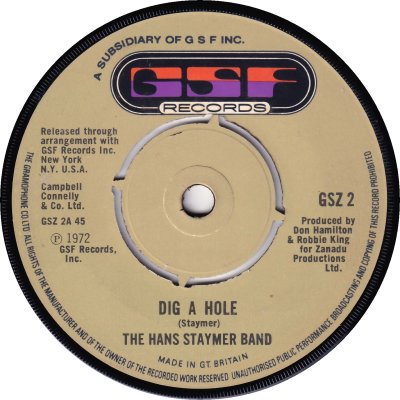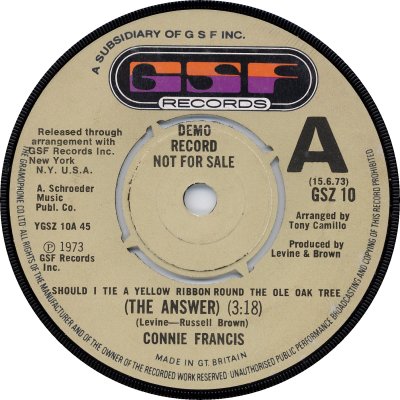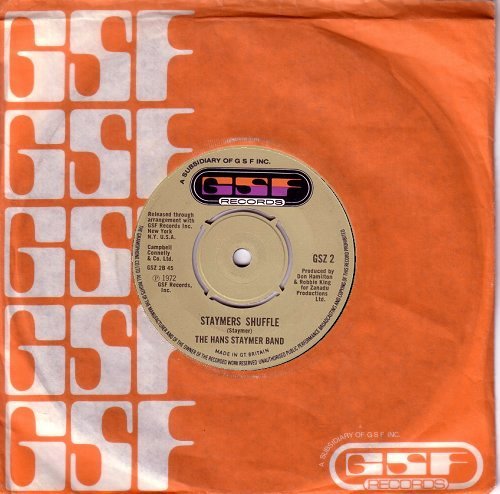


American, out of New York; the label of motion picture production and distribution company GSF Productions. 'Billboard' of the 16th of November 1971 announced that GSF intended to move into the record and music publishing fields in the form of a new subsidiary, the GSF Music Corporation, and that Michael Kusick and Dennis Kaplan had been made vice presidents in charge of creative and general operations. A slight lull followed before 'BB' of the 15th of April 1972 reported that under Larry Newton, previously president of ABC (q.v.), the GSF Corporation was setting up another new subsidiary, GSF Music & Productions Inc., to handle record production, music publishing and talent management. The company's record label, as yet unnamed, would cover Pop, Country, Soul and Jazz. Distribution was being arranged, and the first records were expected to come out in the summer. The first three singles duly appeared, on the GSF label, as noted by 'BB' of the 1st of July; the expectation was for twenty singles to be released in the first year. Rock had replaced Country in the list of genres that were to be covered, and the first album was due out in August.
Once it was launched, GSF set about establishing a network of licensees for its product. 'BB' of the 22nd of July 1972 said that in his capacity as director of international operations Kusick - alternatively spelled Gusick - had signed an agreement with Metronome to cover Germany, Austria, Switzerland and Scandinavia, and other issues noted other agreements. EMI picked up the rights for the UK, and 'BB' of the 16th of September was able to give the prefixes that would be used for GSF records. GSF purchased its first master, 'So Much Trouble In Mind' by Joe Quartermain & Free Soul, from the Mantis Record Corporation ('BB', 9th September), Lloyd Price was appointed director of A&R in November with a brief to seek out and develop new talent for the label ('BB', 18th November), and towards the end of the year the company gave a 'heavy' promotional push to its album of 'Free The Black Man's Chains' by the Afro-American Ensemble, which it claimed was 'the first Black Rock Opera'.
1973 seems to have been a steady year for GSF. It only just missed its twenty-single target, and it launched Encounter, a label for 'funky, commercial Jazz'. 'BB' of the 23rd of June said that the company were looking for more artists for the one-month-old label; it had five albums lined up for release, and the intention was to double that number over the course of a year. Sales manager Al Silver was reported in 'BB' of the 30th of June as saying that Connie Francis's 'answer disc' to the Dawn hit 'Tie A Yellow Ribbon Round The Old Oak Tree' had sold 70,000 copies in a week, mainly to jukebox operators, and that as a result GSF was to make a big push into the jukebox singles market; the same issue observed that GSF was to undertake distribution of Harry Finfer's 'Grand Records' label. Sadly none of these developments were to last for very long. GSF Records seems to have ground to a halt fairly early in 1974, after the release of just two singles - a third appears not to have made it past the 'promo' stage. 'BB' of the 11th of May broke the news that Silver had left the company, and that was GSF's final mention.
GSF was less prolific in Britain than it was in its homeland. It managed around a dozen singles, numbered in a GSZ-0 series, none of which troubled the Chart compilers. Most of them were in an R&B / Soul vein; 'My Hang Up Is You' b/w 'It's A New Day' by Skull Snaps (GSZ-7; 4/73) is very collectable nowadays. They came in a company sleeve. Manufacture and distribution were by EMI, and demo copies were marked in the usual EMI house style (2).



Copyright 2006 Robert Lyons.

